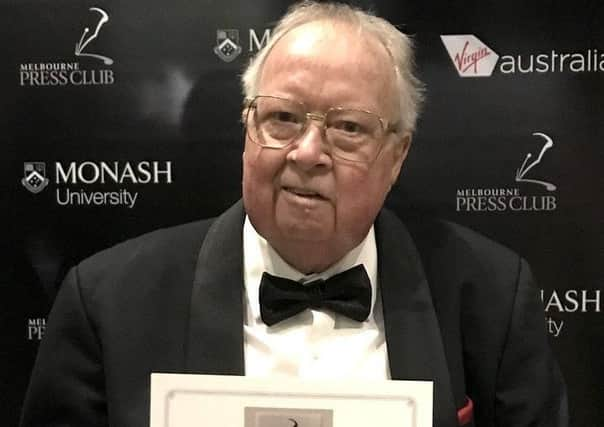Obituary: Russell McPhedran, Scot who snapped the stars '“ and took one of the pictures of the 20th century


Glasgow-born Russell McPhedran, who has died aged 82 in Sydney, was one of the world’s best known photojournalists, whose photograph of the hooded Palestinian terrorist on the balcony of the Israeli team’s quarters during the Munich Olympics in 1972 was one of the 20th century’s iconic images.
In an outstanding career over more than 50 years, which included spells working in Hong Kong and London, as well as his base in Australia, he took highly-acclaimed pictures of many celebrities and famous events, often on overseas assignments throughout the world.
Advertisement
Hide AdAdvertisement
Hide AdHis subjects included the Beatles, Princess Margaret, the Kray brothers, Bill Clinton, Ronnie Biggs and Frank Sinatra among others, while he also covered eight Olympic Games and numerous Commonwealth Games, including Edinburgh 1986.
He won various awards including the World Press Sports Photo, a Walkley prize in Australia for best news photo of the year and was honoured with admission to the Australian Media Hall of Fame in 2017 for his “iconic career in photojournalism”.
A talented photographer who worked hard to develop his craft, he also had an excellent nose for a story, and the combination of these factors alongside a winning personality that helped open doors underpinned his success.
Born in Partick to Donald and Louise, he was the eldest of three children, whose brother and sister were also named Donald and Louise. Brought up mostly in Monklands, the family emigrated to Australia in 1950, as medical advice recommended Donald be brought up in a warmer climate for health reasons.
Their father was a skilled football maker and with the game beginning to take off Down Under, he was able to continue in this work.
Arriving in Sydney, the family settled in the Botany Bay area and Russ, as he was known, attended Randwick High School, where he showed promise as a footballer and soon learned ‘to speak Australian,’ as nobody could understand his Scottish accent. Taking a job with The Sun as a copy boy in their photography section, one of his first jobs was to collect film from the Davis Cup tennis match being played locally.
This triggered a lifelong fascination with photography and he determined to become a professional, learning as much as he could from senior photographers. In the early 1960s he went to work for a period in Hong Kong.
This motivated him to try to find work in Fleet Street, then the Mecca for photojournalists and difficult to break into.
Advertisement
Hide AdAdvertisement
Hide AdAs a result of purporting to cede exclusivity of photos he took of Princess Margaret to the Daily Express, the newspaper gave him a three month trial, which became full time.
That provided a launching pad as he began covering high profile stories involving the Beatles, the Profumo affair, the Great Train Robbery and the Kray brothers. In 1968, on Anzac Day when back in Sydney working for The Sun, he took the photo which established him worldwide.
After completing his duties, he was in the pub with colleagues when an instruction came through for one to attend a huge fire at Buckingham’s Store in Oxford Street. They drew straws and he pulled the short one.
As the fire raged, he took a photo as the entire façade of the store collapsed and it went universal. McPhedran said this was his favourite photo and remarked: “The adrenaline rush you get when you take a great picture is fantastic.”
He was then able to choose assignments, which was how he came to be in Munich in 1972, by then for the Sydney Morning Herald.
Up early to meet Australian deadlines, he was tipped off about something happening in the athletes’ village and went straight there where he learned of the terrorist attack on the Israeli athletes.
While most attention was focussed on two of the Palestinians, another with his face covered by a balaclava appeared briefly and menacingly on a balcony before returning inside, but not before McPhedran got the photograph that captured what was described as a ‘new era of global terrorism’.
That was the first of eight Olympics he attended, the last fittingly being in Sydney 2000.
Advertisement
Hide AdAdvertisement
Hide AdIn 1979, he won the World Press Sports Photo award for his picture of two of the world’s top sprinters, Hasely Crawford of Trinidad and Tobago and Don Quarrie of Jamaica gesticulating at each other as they crossed the line in the 100m semi-final of the 1978 Edmonton Commonwealth Games.
In 1985, he talked his way into Ronnie Biggs’ 20 years of Freedom party in Rio, by offering him a collage of poster prints of photos he had taken of him previously, enabling him then to secure highly-prized pictures of Biggs and his entourage.
Before retiring in 2004, he was head of Associated Press in Sydney for 20 years.
While first working for The Sun, he met colleague Shirley Jaeger who later joined him in London where the couple married in 1964 and went on to enjoy 54 years together, living mostly in the northern suburbs of Sydney.
An accomplished tennis player in his youth, he became an enthusiastic golfer, whose hero was Ben Hogan, and played at Pennant Hills club.
A man of great integrity and popular with all, he was very encouraging to younger members of his profession with whom he was happy to share his knowledge.
He is survived by his wife, five nieces and a nephew.
JACK DAVIDSON